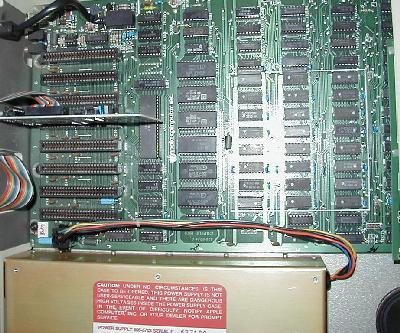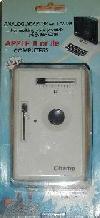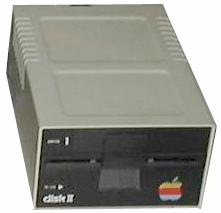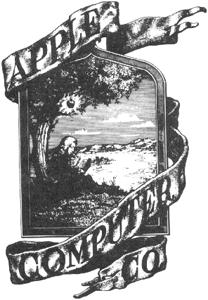
Apple II

UNIT SOLD = 2,000,000 plus
The personal computer family from Apple that pioneered the microcomputer revolution and has been widely used in schools and home. It uses the 8-bit 6502 microprocessor running at 1MHz, an 8-bit bus and runs under Apple's DOS or ProDOS operating system. AppleSoft BASIC is built into ROM and always available. With a Z80 microprocessor board plugged in, Apple IIs can run CP/M programs, such as dBASE II.
Click here to view an ad introducing the APPLE ][
 The back
 The paddles and an analog adapter for joystick.  ... ... The famous disk drive  |
 The Apple ][ was cloned by the hundred in the early 1980's. The name of this one is TC-80A. |
The Apple I, the grandfather of all Apple Computers!

- Processor: MOS Technology 6502, 1.023 MHz.
- Memory: Came with 4k RAM (expandable to 8k, 65k with clever hack).
- Ports: any standard ASCII keyboard that could be installed (as shown at left), and any monitor.
- Display: frame rate of 60.05 Hz, could support 40 characters per line at 24 lines, with automatic scrolling.
- BASIC, so games could be programmed and played on it. Woz wrote a BASIC language assembler into the ROM by hand using only hex.

 Jobs originally wanted to sell it for $777.77. Woz insisted that this price was to high so he agreed to sell it for $666.66 When he was asked why he picked this number (the mark of Satan) he answered that he just took a lucky number, 7, and subtracted one. Ron Wayne, left the company shortly after Apple delivered their first order. Because Jobs planned to go highly in debt to build large quantities of the Apple I. Having lost a lot of money in other investments with new computer companies, he wrote a letter of resignation to Apple and gave back his 10% in Apple stock. He received $500 in cash for the work he had done. |

